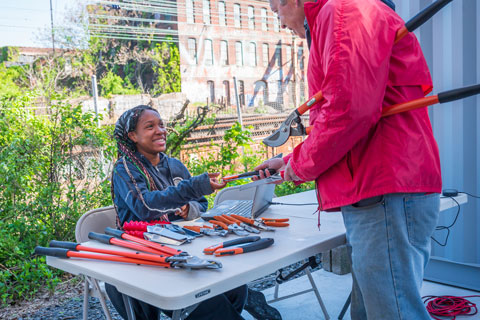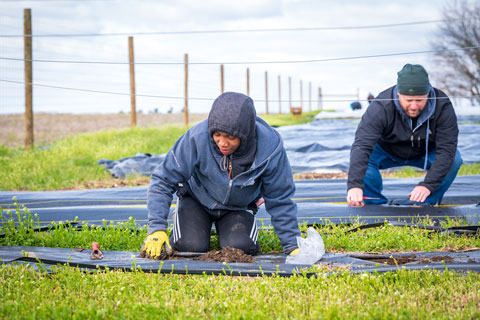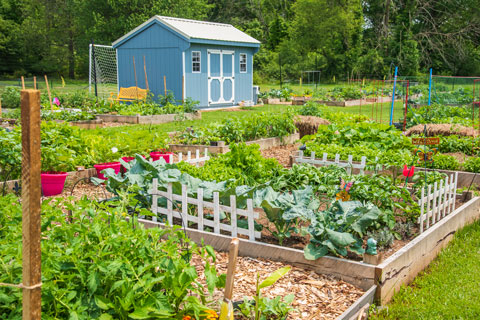3/1/2024
From Seed to Community
Grace Savage

Philadelphia, like many major cities across the U.S., is facing challenges like poverty, food insecurity, crime and climate challenges such as rising heat and air pollution. The Pennsylvania Horticultural Society (PHS) is on a mission to garden for the greater good, to improve health and well-being for all through the power of horticulture.
Pictured: PHS also maintains a large gardening “tool library,” where community gardens can borrow over 500 tools for free.
The PHS Community Gardens program directly supports nearly 180 community gardens in the region in growing and sharing fresh, organic food, helping to alleviate food insecurity, empower communities with technical growing skills and support the preservation of unique cultures through food.
The need for community gardens
In the bustling urban setting of Philadelphia, 16 out of every 100 households face the harsh reality of food insecurity. This equates to over 250,000 Philadelphians who do not have regular access to fresh, nutritious food. Seventy-one percent of food-insecure households make yearly incomes below the federal poverty line, and Black and Latino populations are disproportionately affected. Community gardens alleviate food insecurity through empowering residents to grow and share their own food while helping communities retain closer ties to their culture through food and gardening practices. Today, Philadelphia has hundreds of gardens region-wide and nearly 180 of these participate in PHS’s community gardens program.
A legacy of growing
PHS’s history of supporting community gardens dates back to the Philadelphia Green initiative in the 1970s and ’80s, when PHS worked with community groups to establish community gardens throughout Philadelphia.
In 2010, PHS initiated the City Harvest program to better support gardens in growing and donating excess produce to those in need. Since then, they’ve developed two additional programs: Green City Teachers and Garden Tenders. Green City Teachers provides education, lesson plans and other materials for any educators working with youth to help cultivate the next generation of gardeners. Garden Tenders is an intensive educational course for community gardeners to learn the basic skills needed to help maximize their harvests. All of these programs work in tandem to educate people about gardening.
 In the past seven years, PHS’s network of community gardens has grown from 140 to nearly 180, and the program provides a wide range of support and assistance for community gardeners, ranging from urban agriculture education, technical and infrastructure assistance, stewardship and governance support services, as well as growing and donating over 275,000 free organic seedlings each year to gardeners to help kickstart their growing seasons.
In the past seven years, PHS’s network of community gardens has grown from 140 to nearly 180, and the program provides a wide range of support and assistance for community gardeners, ranging from urban agriculture education, technical and infrastructure assistance, stewardship and governance support services, as well as growing and donating over 275,000 free organic seedlings each year to gardeners to help kickstart their growing seasons.
Pictured: The PHS program provides a wide range of support and assistance for community gardeners, ranging from urban agriculture education, technical and infrastructure assistance, stewardship and governance support services
PHS also maintains a large gardening “tool library,” where community gardens can borrow over 500 tools for free. From shovels to a cider press, the benefit of access to a tool library is immense—whether tackling daily gardening tasks or completing more specific, one-off projects, which often require pricey tools, gardeners can turn to the tool library for support. Since the introduction of the tool library, over 3,000 gardening tools have been rented out for free.
A partner in growth and giving
PHS staff engage with community gardeners through consistently listening and responding to their needs, serving as a partner and providing support where it’s needed most.
The program also provides support for community gardeners in building good stewards of the land through providing resources and education on how to create and maintain a community garden’s system of governance, manage conflict and develop inclusive leaders.
Culturally relevant seedlings and the power of preservation
PHS has worked with gardeners of Latin, Caribbean, Asian and African-American descent to provide culturally relevant seedlings for these groups to grow and share. The process for supporting the growth of culturally specific produce is much the same as for providing other types of seedlings—PHS begins by listening to members of these cultures to identify what crops they would like to have and from there assists with sourcing seedlings and propagation efforts.
In this way, community gardens become more than just vessels for food production—they help to preserve and sustain unique cultural dishes, recipes and crop varieties that have been cherished for generations.
As PHS’s Director of Community Gardens, Justin Trezza said, “Food and culture are intertwined, and the ability to grow and share a piece of one’s cultural heritage in a new place helps individuals maintain a connection to their roots while also sharing it with others.”
The impact on communities
PHS’s support is often vital for supporting a garden’s growing capabilities over time because many gardens are volunteer driven and resource scarce. Additionally, through providing access to 275,000 free seedlings, seeds, supplies, and even capital funding and support to its network of community gardens, PHS helps alleviate cost barriers that could limit a garden’s growing capability.
Infrastructure improvements like new water lines, compost bins, lumber and other large projects that would be financially burdensome for gardeners are often funded to assist gardens with what they do best—grow.
 Pictured: PHS’s network of community gardens has grown from 140 to nearly 180.
Pictured: PHS’s network of community gardens has grown from 140 to nearly 180.
Through partnership with fellow non-profit Neighborhood Gardens Trust, PHS works to ensure that vacant lots used for community gardens are protected from future land development, ensuring that Philadelphia’s rich history of community gardening continues, and that gardens can continue to provide a place for connection, cultural preservation and celebration, and autonomous urban agriculture for residents.
In 2023, PHS's community gardens program supported the growing and donation of over 250,000 pounds of produce to community members in need, amounting to an estimated value of over $450,000.
Lessons for other cities and the future of urban agriculture
Recent research in conjunction with the University of Pennsylvania found that proximity to green space delivered nearly a 70% reduction in feelings of depression in residents. Gun violence in areas surrounding remediated vacant lots experienced nearly a 30% reduction. Due to increased access to these shared green spaces, residents reported being more likely to socialize with neighbors. Community gardens emulate these effects—they are vital community assets that bring neighbors from all walks of life together for the shared purpose of tending a garden and growing food. However, greater recognition of the value of urban agriculture for food production and investment in preserving these spaces is still needed.
PHS is hopeful for the future. With the USDA opening an office focused on urban agriculture in Philadelphia and new governmental bills advocating for greater investment in development, the shift towards recognizing the importance of urban food production is undeniable.
With greater investment from city leaders, community gardening offers boundless potential to improve community health and well-being, reduce the effects of food apartheid, and preserve and celebrate unique cultures.
“PHS has always known the immense impact that gardens and horticulture deliver for the health and well-being of communities, which is why PHS serves as an integral partner to community gardeners across the region, helping them increase their growing capacity while sharing and learning from one another. We hope that with continued investment from our leaders in urban agriculture that cities will begin to shift from seeing these vital community spaces as ‘nice to have’ amenities to ‘must-have’ infrastructure for a healthy, thriving city,” said PHS President Matt Rader. GT
Grace Savage is Public Relations Coordinator at the Pennsylvania Horticultural Society. In this role, she assists in managing public relations, thought leadership and social media relationship programs for the organization, helping to tell the PHS story and drive lead generation efforts. Grace earned her Bachelor of Arts in Communications and Public Relations at Temple University in 2021.